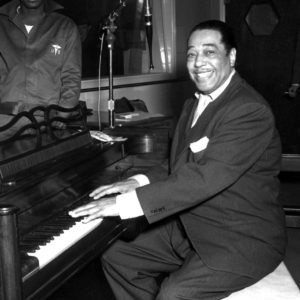Duke Ellington (1899-1974) was one of the greatest American composers and he deserves the exposure that would come from becoming a standard part of music lessons for players of any instrument. Piano players might feel the greatest affinity to Duke Ellington since that was his instrument, but they certainly would not be the only ones. Anyone on any instrument can hear that his music is fun to play, accessible and rich in style and meaning.
I grew up with piano lessons that included the usual combination of teaching books written by music teachers and simplified versions of classics for young players, which then led to the first easy classics. They didn’t really teach us to play fun music, to improvise or to play by ear. We had to find that for ourselves. The first jazz song I ever saw on a chart and played at home was Duke Ellington’s Satin Doll, which a friend gave me. We wanted more but we had to look outside of our traditional music lessons to get access to it, which we did. Fortunately today there is a greater variety of music available than ever before, including printed and recorded music of Duke Ellington and lots of others.
Songs like Sophisticated Lady, Black and Tan Fantasy, Mood Indigo, Take the A Train (yes, by Billy Strayhorn but still a part of this catalog), Solitude, Prelude to Kiss, In a Mellow Tone, Cottontail, Don’t Get Around Much Anymore and Do Nothing Till You Hear From Me are fun to play and are accessible to beginning and intermediate players. Duke Ellington also wrote church music, symphonic music and theater music. But the song book is where to start, and the sooner the better, I think, for any player.
Duke Ellington belongs in the company of all the other great composers. It would be important for an African-American composer to be seen among composers like Bach, Mozart, Beethoven, Schumann and Debussy. More popular access to Duke Ellington could also open the door to the music of many other 20th-century African-American composers such as Charles Mingus, Thelonious Monk, Tadd Dameron and Herbie Nichols, which they all deserve.
Duke Ellington plays and speaks on Australian TV
[•]

